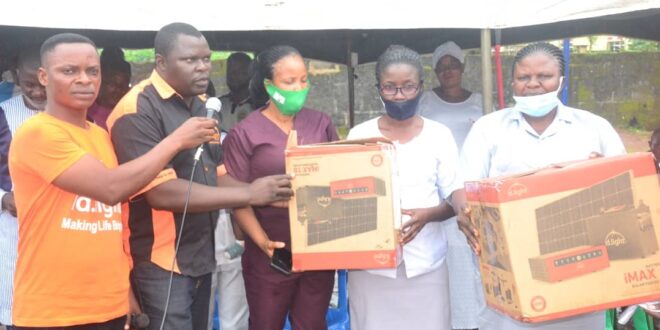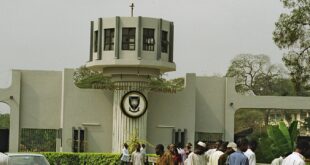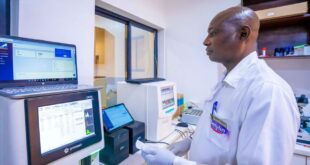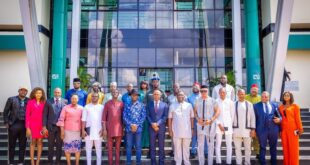600 health clinics across sub-Saharan Africa use solar-powered lights and energy systems to stay open for longer. Expectant mothers in rural Africa no longer give birth in darkness, thanks to off-grid solar energy provided by d.light
………
PALO ALTO, CA., USA, AND NAIROBI, KENYA – 21 August 2023 – 600 health clinics across sub-Saharan Africa are able to provide care and treatment to patients outside of daylight hours, thanks to solar-powered lights and off-grid energy systems provided by d.light, the global provider of transformational household products and affordable finance for low-income households and communities in the developing world. As a result, the clinics can extend their operating hours – including for expectant mothers in labour who would otherwise have given birth in darkness.
“Before d.light, we would be looking for torchlight in the middle of the night to deliver babies. We no longer have to go through that stress,” explained Dr Ajayi Olaoluwa, Chief Matron at Omatosu Basic Health Centre in the town of Okitipupa in Ondo State, southwest Nigeria.
The World Health Organisation (WHO) estimates that close to one billion people in low- and lower-middle-income countries are served by healthcare facilities without reliable electricity access or with no electricity access at all. According to WHO, 15 percent of healthcare facilities lack any access to electricity in sub-Saharan Africa, whilst only 50 percent of hospitals in sub-Saharan Africa report reliable energy access.
Lack of electricity is a major barrier to the delivery of quality healthcare services, and one that particularly impacts rural communities across the continent. According to Unicef, the lifetime risk of maternal death ranges from 1 in 5,300 in high income countries to 1 in 49 in low-income countries. For example, in Western Europe, the rate is 1 in 11,000. This rate is drastically and fatally higher in the African continent however: in sub-Saharan Africa the rate is 1 in 41, and Sub-Saharan Africa alone accounted for 70 percent of global maternal deaths in 2020.
Ms Olanrewaju Emilia Olanike, Chief Matron at a primary healthcare centre in the Ife South local government area (LGA) of Osun State in Nigeria, described the impact of the solar lanterns on the clinic and its patients, “In the Olode area we have been experiencing a 10-year power outage, so before today we did not have a power supply. The installation of this alternate power supply means that our clients who were afraid of coming to us in the night have now been coming. It makes our job easier especially during labour and delivery cases at night.”
Commenting on the milestone of 600 clinics powered by d.light, d.light co-founder Ned Tozun said, “I remember early on in d.light’s history, a nurse shared with me that she had already delivered 15 babies with d.light’s products. Before, they had been delivering babies using only dangerous kerosene lanterns, or they would even have to turn pregnant women away if they were in labour in the middle of the night.”
“With d.light’s solar-powered products, expectant mothers no longer have to give birth in darkness. Clinic staff can also admit and care for other patients at night more easily when there’s a safe source of light available. Patients find the light of the d.light lantern comforting when they’re being treated.”
“It’s easy to take for granted the ready availability of something as basic as light in developed countries – including in our hospitals and clinics,” Tozun continued, “But for millions of people worldwide, reliable and safe light is still often out of reach. For rural health clinics in Africa and elsewhere in the developing world, access to artificial light can mean the difference between receiving vital care and treatment or not. When you improve the health and wellbeing of pregnant women and their newborn children, you safeguard the next generation and also the families and communities that depend on these women.”
Since d.light was founded in 2007, the company has transformed the lives of 150 million people worldwide. The majority (55.5 percent) of d.light’s customers live in sub-Saharan Africa, including 45 percent in East Africa. Its range of household products include solar-powered lanterns, cookstoves, solar home systems, TVs, radios, and smartphones, together with its low-cost payment plans that allow customers to pay for their products over time.
………….
About d.light
Founded in 2007 at Stanford, California, d.light is a global leader in making transformative products available and affordable to low-income families. d.light has sold nearly 30 million products, including solar lanterns, solar home systems, TVs, radios, and smartphones, impacting the lives of over 150 million people. Our vision is to transform the lives of one billion people with sustainable products by 2030. For further information, visit: https://www.dlight.com
 THE AFRICAN COURIER. Reporting Africa and its Diaspora! The African Courier is an international magazine published in Germany to report on Africa and the Diaspora African experience. The first issue of the bimonthly magazine appeared on the newsstands on 15 February 1998. The African Courier is a communication forum for European-African political, economic and cultural exchanges, and a voice for Africa in Europe.
THE AFRICAN COURIER. Reporting Africa and its Diaspora! The African Courier is an international magazine published in Germany to report on Africa and the Diaspora African experience. The first issue of the bimonthly magazine appeared on the newsstands on 15 February 1998. The African Courier is a communication forum for European-African political, economic and cultural exchanges, and a voice for Africa in Europe.









